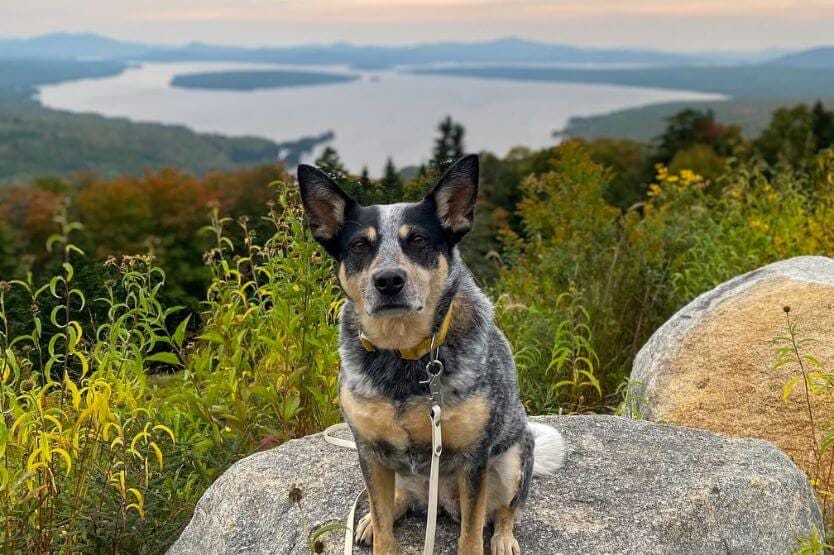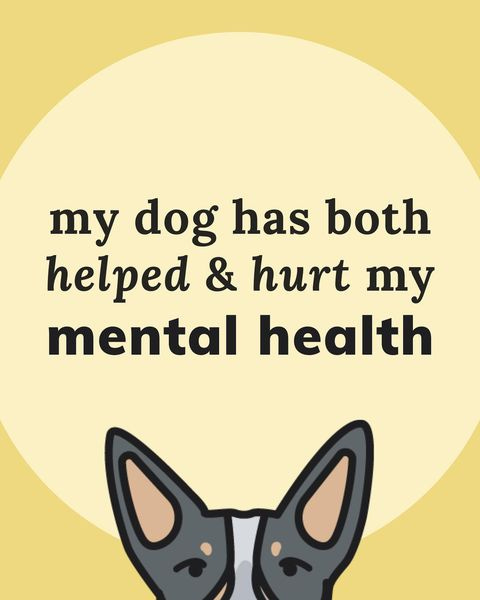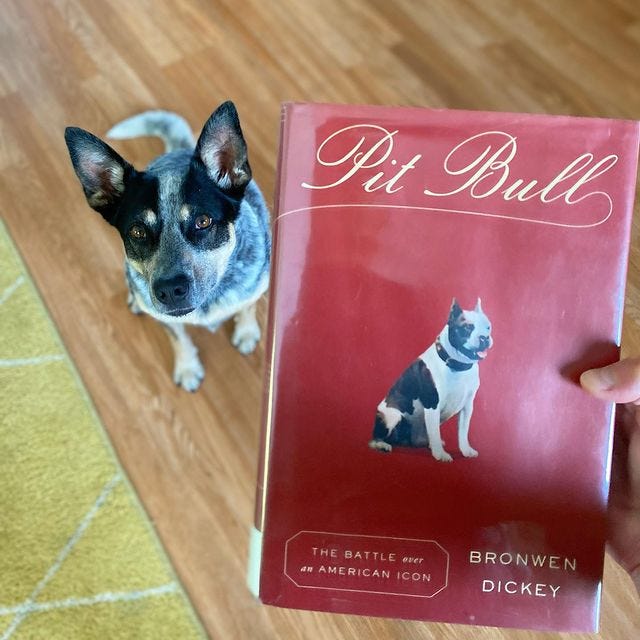I don’t think “everyone should have a dog” actually
You can love dogs and still not have one of your own
I love dogs. All dogs. I adore puppies and seniors and hounds in their prime. Our long history of coevolution amazes me. Man’s best friend deserves better from us.
And this love for dogs is precisely why I do not believe everyone who likes the idea of a canine companion should go get one. (It’s not uncommon for Sean or I to say something like “wouldn’t this be nicer with fewer dogs around?” while out in a busy environment.)
Hear me out: Could life be better, for people and pets alike, if fewer of us were responsible for dogs full time? Or if we at least asked ourselves more critical questions before bringing home a new family member? I know this can be a pretty controversial take… so I’ve spent some more time pondering.
Here are a few reflections.
You can love dogs and still not have one of your own
There are the obvious people you’re probably thinking of who shouldn’t own dogs. People who mistreat them, who horribly misunderstand them, who don’t even seem to enjoy them—people who think their living breathing sentient companions should behave more like robots or fashionable furniture.
But there are also people who love animals, who have their hearts firmly in the right place, who get genuine joy out of spending time with canines… who still maybe shouldn’t have a dog of their own if we’re looking to maximize everyone’s best interests.
Like everything in the dog world (and life overall) we can unpack a lot of nuance.
1) Some people like the idea of dogs better than dogs themselves
These people would (truly, with no ill will meant) do better to have a cute stuffed animal or occasionally hang out with other people’s’ dogs rather than care for one all on their own.
And I used to be one of them!
As a kid, I thought all dogs were happy-go-lucky companions like Disney cartoons. I wanted Lassie. Or Wishbone. An unconditionally loving, unflappable best friend who appeared in my life fully trained and prepared to tackle all sorts of adventures with me.
The problem is that Lassie and Wishbone aren’t real animals. They’re characters. And while many domestic dogs do have a bunch of incredible traits (hi hello yes I’ve devoted my whole professional life to writing about these amazing creatures!) it’s unfair to expect all our canines to act like favorite book and TV superstars.
Here are some truths it took me a while to get my starry-eyed head around:
Individual dogs have their own personalities. Just like we humans do!
Dogs are naturally predators and scavengers. They do not automatically understand that a certain small mammal (say, your neighbor’s rabbit) is part of the family while another (a squirrel on a walk) is okay to chase, for example.
In general dogs have different social norms and instincts than people. Many things we collectively view as “bad” are totally reasonable in a canine’s eyes. Dogs don’t subscribe to human morals, values, or standards.
Not all dogs are indiscriminately social. Yes, they affiliate with humans unlike any other species! No, that doesn’t mean they love everyone all the time (and we in fact bred many of them to feel the exact opposite).
Dogs can be very messy by our human perspective. Even ones who are advertised as hypoallergenic or low maintenance grooming.
If someone isn’t prepared to navigate those realities, everyone involved will be happier if they actually don’t take on full responsibility for a dog of their own.
2) Many modern human environments aren’t suited to many dogs
I’m a big believer that it’s not about where you live with your dog, it’s about what you do with your dog. (You can read some old apartment thoughts in this article and reflections on having a yard in this one.) I stand by this sentiment more than ever now that we’re full time in our van!
That said: It’s still worthwhile to consider our dogs’ natural traits and tendencies. To try to understand what things bring them joy… and what things bring them distress.
Environment isn’t everything
Dogs can and do thrive even in some of our world’s busiest metropolises. Many owners in crowded apartments give their companions the best possible life. (I would like to be adopted by these families myself, honestly, and this section is not at all about them.)
I am the last person to tell a dedicated guardian, with access to resources they need, that they shouldn’t have a dog simply because of where they call home.
But I’ll also be the first to say that we should think critically about how we’re living—and ask whether sharing those experiences with a canine is honestly the best thing for everyone involved. Not everybody needs a dog, especially if 1) their lifestyle or surrounding environment is directly at odds with canine instincts or senses and 2) they aren’t able or willing to provide suitable alternatives for fulfillment and decompression.
Where we live does affect our dogs
Some human cities are, to put it simply, overpopulated. We keep inhabiting environments one could argue are quite outside of our initial evolutionary niche. Even many of us people—social animals interacting with our own species!—find these situations draining.
While dogs have historically thrived just about everywhere we have, I don’t think that’s something we should take for granted. Especially if we continue to pile on top of each other like this.
Do our modern environments create more behavior problems?
Dog trainers often talk about seeing increases in behavior issues (especially forms of reactivity to people or other animals) in these sorts of modern environments.
I think we need to note confounding variables here, like 1) that today’s guardians care more about our dogs than many used to (yay!) so notice problems more readily and 2) that we might be more willing to work with pets who have struggles instead of immediately rehoming or euthanizing them (also yay).
But the overall point does stand. It’s pretty unnatural for dogs to be forced to interact with strangers of any species, in close quarters, all day every day.
Environment is part of the “should I have a dog” equation
Ultimately: If someone lives in a massive city but is ready to dedicate a huge portion of their daily resources to meeting their dog’s needs? Amazing. Let’s go find them the perfect dog!
If they just want to drag their pet along like an accessory, though, not truly considering their canine’s experience and if they can work within their environment to fulfill them? Problems ensue. Not only is this a sad life for the dog in question, but these pets often also end up affecting those around them by directing pent-up energy towards others in shared spaces. These bad experiences can in turn have ripples ranging from new reactivity cases to encouraging apartments and parks to ban pets entirely.
3) Dogs can help and hurt our mental health
I am all for raising awareness of pet ownership’s potential benefits. Almost every shelter I’ve ever volunteered at has had some sort of sign in their lobby highlighting the pros of adopting a dog or cat. And for good reason! There are so many delights to consider.
But I also think we need to emphasize the word “potential” and remember that not everyone’s experience will look the same.
One of my most popular blog and Instagram posts to date is a reflection on some of the ways Scout has both helped and hurt my mental health. While I’ll be the first to talk about how amazing it is to share life with a canine (I hope this whole website speaks for itself) I believe it’s important to share the not-so-rosy realities, too.
When we blindly encourage everyone who’s ever thought about getting a dog to go adopt one right away… we run the risk of sending loving, well-intentioned people into the experience unprepared.
And life is better for all creatures when we make these decisions thoughtfully with an understanding of possible risks, costs, and benefits. It’s not selfish to carefully consider whether caring for another living being is a genuinely good idea right now. In fact, taking our commitments seriously—even when we might really want a rosy vision of something—is selfless.
4) Not everyone is in the right place to care for another creature
Speaking of going in prepared: Some of us aren’t in a position to take on a dependent. And that’s okay.
When I hear people say things like “everyone needs a dog” or “I don’t trust anybody who doesn’t have at least one pet” I don’t just feel for the folks who aren’t interested in having a canine companion right now (and who have every right to have their own opinions and preferences).
I also think of all the animal lovers out there who would be thrilled to share their life with a furry best friend but don’t have the current capacity. The college student desperately missing her childhood dogs. The professional constantly traveling for work. The dedicated parent saving to move into a new house. Telling them they must go bring home a new family member feels tactless at best.
I have immense respect for anyone who wants a dog but recognizes that maybe it would be better to wait. That sort of forethought is kinder for everyone in the long run!
Access to resources and education is vital
This was one of my top takeaways from Bronwen Dickey’s Pit Bull book, and it’s something my friend Kassidi does a fantastic job talking about on her Instagram account @gingers_naps.
When I say that not everyone is in the right place to care for another creature, I am not referring to a character fault, to some inherent flaw they have, or to anything else they’re doing wrong. (Yes, those people exist. I talked about them in the first section of this piece and they don’t need any more of our time.)
No, the majority of people I’ve met who aren’t currently able to meet a dog’s needs are absolutely delightful animal lovers struggling with other things—often systemic issues like housing insecurity and poverty.
If we really love dogs as much as we say we do, we’ll try to address these root causes at the human end of the leash instead of just bleating that “everyone should have a dog!” and leaving it at that.
Alternatives to taking on full long-term responsibility for a dog
There are plenty of ways to spend time with canines without actually bringing one into our home for the long term. In the grand scheme of things, you could argue some of these alternatives make an even broader impact.
Volunteer at a local animal shelter
Shelter staff and volunteers gave my family’s husky, Snort, her eye medicine every day for more than six months before we adopted her. They took Scout on her first few walks and helped potential adopters () get a feel for what kind of companion she might be. They provided support when we had questions about our foster puppies. On and on and on.
Most animal shelters and rescues I’ve connected with are always looking for more volunteers to help with everything from walking and playing with dogs to cleaning kennels to assisting with social media promotions and lots in between.
Foster for a local rescue
Fostering has been one of the most rewarding things we have ever done. I think about our foster dogs almost every day—the experience had a massive impact on me, my husband, and our resident heeler. It was an amazing way to hang out with other canines while also feeling like we were making a difference.
Fostering is an especially great option for people who aren’t entirely sure they want a dog of their own or who want to be positive they’re truly ready for all it might entail. You can have a “trial run” of sorts without the full intensity of a lifelong commitment!
Pet sit for family, friends, or other clients
What better way to reap the joys of “dog time” without having all the responsibility squarely on your own shoulders? This is very much how I feel about hanging out with my niece, Olive. I will eagerly babysit her any day with a huge stupid grin on my face… but then I get to hand her back to my sister and take a break from soiled diapers.
(And, in a much more real sense, get relief from the pressure of having a helpless infant depending on me for absolutely everything. That’s an incredible thing to experience—but also an exhausting one. And it’s okay to admit that I am not sure I want that all the time.)
Work or volunteer with a nearby dog trainer, groomer, etc
I’ve met a surprising number of people in the online dog community who don’t actually have a dog of their own but who love training or grooming or otherwise hanging out with other people’s dogs. It can be a nice introduction to the world of canines before getting a dog of your own or way to kickstart a long-term career.
So… am I telling everyone they shouldn’t go adopt a dog??
If you’ve read this far I hope the answer here is an obvious no. But you can never be too clear on the internet 😉
I think it’s amazing to share our lives with fellow creatures. I think we should continue discussing potential benefits of pet ownership. I think people and dogs make a great team—and I never want to see our centuries-old partnership end!
I just want us to be more thoughtful about that partnership.
I want us to stop blindly telling everyone and their brother that they have to go get a dog of their own. I want us to avoid minimizing the very real effort and complications that can arise when we are responsible for another living being. I want us to focus on creating a world where everyone who wants a dog can care for one (and where those who don’t want a pet aren’t unfairly vilified for making their own thoughtful decision).
In summary, I think people should consider not getting a dog right now if:
They simply don’t want a pet. (Yes, not everyone loves or wants to live with dogs. And that’s fine!)
They like the “idea” of an easy cartoon dog better than the often-messy reality.
Their environment is at odds with meeting a canine’s needs—and they aren’t willing or able to work around it.
It would be valuable for them to focus on their own mental health before bringing another creature into the mix.
They don’t currently have the resources to care for a pet. (But if this is the case, we should be helping them access those resources!)





